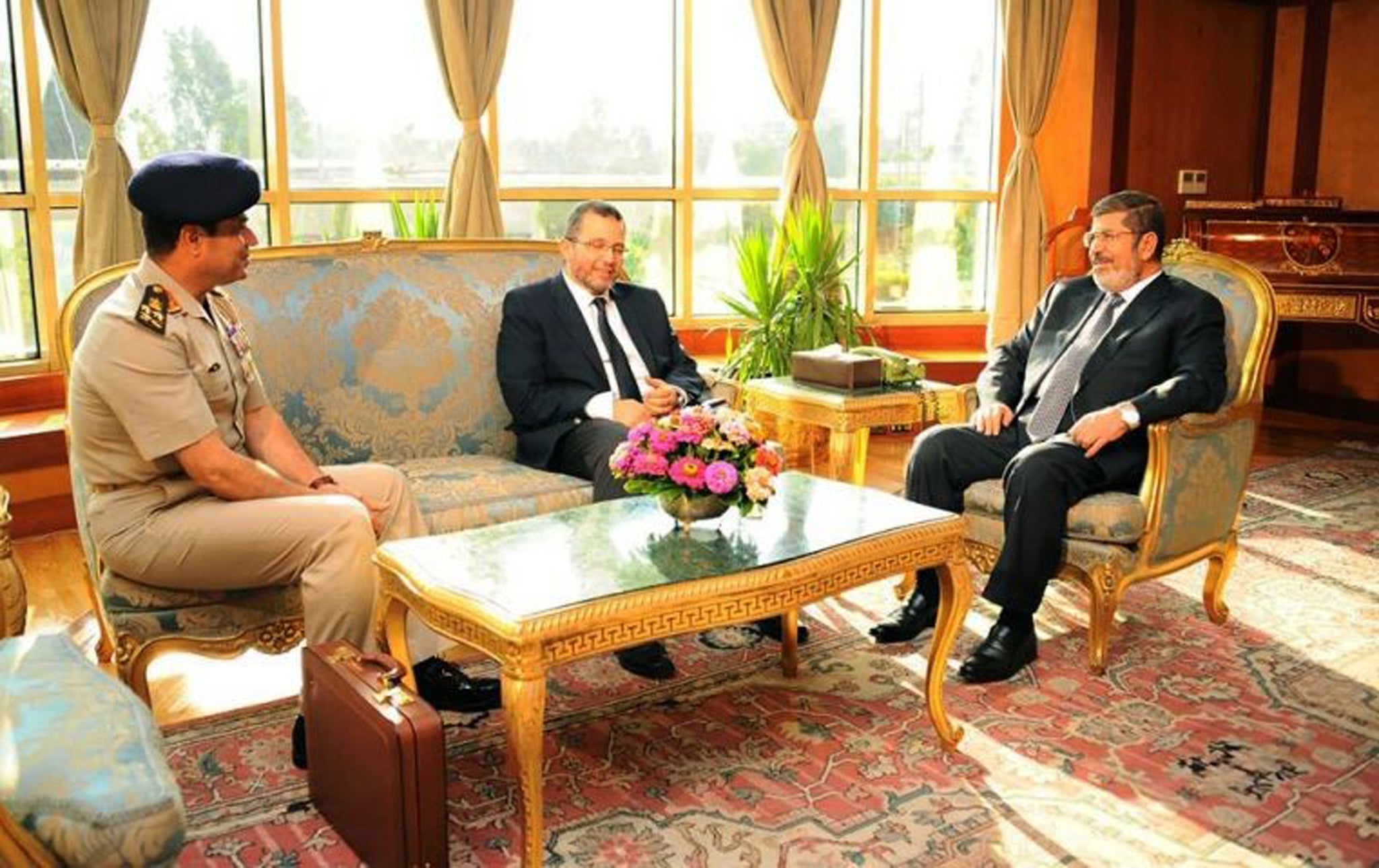Egypt crisis: Revealed - the defiant final days of Persident Morsi
'Over my dead body!' Dramatic accounts from army, security and Muslim Brotherhood officials

Your support helps us to tell the story
From reproductive rights to climate change to Big Tech, The Independent is on the ground when the story is developing. Whether it's investigating the financials of Elon Musk's pro-Trump PAC or producing our latest documentary, 'The A Word', which shines a light on the American women fighting for reproductive rights, we know how important it is to parse out the facts from the messaging.
At such a critical moment in US history, we need reporters on the ground. Your donation allows us to keep sending journalists to speak to both sides of the story.
The Independent is trusted by Americans across the entire political spectrum. And unlike many other quality news outlets, we choose not to lock Americans out of our reporting and analysis with paywalls. We believe quality journalism should be available to everyone, paid for by those who can afford it.
Your support makes all the difference.The final moments of Mohammed Morsi's one-year Presidency before he was ousted by his Egyptian military have been dramatically recounted by army, security and Muslim Brotherhood officials.
Speaking anonymously to the Associated Press, allies of the President said they had foreseen the end of Morsi's leadership up to a week before the opposition planned its first major protests and painted a bleak picture of the Brotherhoods decline.
In recent months, the former President had reportedly been at loggerheads with a series of the country's most powerful institutions, including religious clerics, the police and intelligence agencies.
The effect was isolating, officials said. According to some, there was such pervasive distrust between the political leadership and the civil service that the latter began withholding information from Morsi.
The police also refused to protect Muslim Brotherhood offices when they came under attack in the latest wave of protests.
Refusing to acknowledge the broad challenges to his leadership, Morsi relied on his electoral legitimacy, repeatedly returning to the mandate he won in June 2012, according to one of the officials. As a result, he said, the government failed to address the concerns of protestors - tenuous security, rising prices, unemployment, power cuts and traffic congestion.
A Brotherhood spokesman, Murad Ali, said the military had already decided Morsi had to go.
"We were naïve," he said. "We didn't imagine betrayal would go this far. It was like, 'Either we put you in jail, or you come out and announce you are resigning. He didn't do either because he didn't want to hand the country to the military again."
But according to one official, Morsi delivered the final, terse response to el-Sissi's demand: "Over my dead body!"
On Monday, the armed forces announced they had given Morsi 48 hours to meet the protesters' demands or face military intervention. In reality, however, the countdown had begun as early as June 23, when el-Sissi gave Morsi and the opposition a week to work out their differences - a remote possibility given the wide gap between both sides.
"We knew it was over on June 23. Western ambassadors told us that," said one Brotherhood spokesman.
Morsi searched for allies in the army, ordering two top aides - Asaad el-Sheikh and Rifaah el-Tahtawy - to establish contact with potentially sympathetic officers based in Port Said and the Suez Canal, said security officials.
There were no signs that Morsi's overtures had any effect, but the army issued directives to all unit commanders not to engage in any contacts with the presidential palace and, as a precaution, dispatched elite troops to units whose commanders had been contacted by Morsi's aides.
The commander of the 2nd Field Army, Lt. Gen. Ahmed Wasfy, denied that there were any divisions within the military. "We are united. The culture and principles of the armed forces don't allow divisions," he said.
On the surface, Morsi wanted to give the impression that the government was conducting business as usual by holding a string of meetings with Cabinet ministers. But the opposition protests calling for his removal, which were planned for 30 June, began early and the then President had to stop working at Ittihadiya palace on 26 June.
The next day, he and his family moved into the Cairo headquarters of the Republican Guards, an army branch that protects the president, his family and his palaces and residences. Morsi worked at the Qasr El Qouba palace and continued to do so until June 30, when the Republican Guards advised him to stay put at their headquarters.
According to Egyptian newspaper Al-Ahram, Morsi was offered safe passage to Turkey, Libya or elsewhere, but declined. He also was offered immunity from prosecution if he voluntarily stepped down, but he again said no, the newspaper added.
Morsi gave a speech late Tuesday night in which he vowed to stay in power and urged supporters to fight to protect his legitimacy. Soon after he finished, el-Sissi placed him under "confinement" in the Republican Guards headquarters. Some of his close aides, including el-Haddad, stayed with him.
Troops began deploying across major cities at 5 a.m. Wednesday, ahead of the expiration of the two-day ultimatum given by the army. On the army's official Facebook page, videos of the deployment were posted to reassure Egyptians. At noon, hours before el-Sissi announced the coup, the President's official protectors walked away from Morsi and his aides.
Army commandos soon arrived. There was no commotion, and Morsi went quietly, taken to an undisclosed Defense Ministry facility, officials said.
Additional reporting by AP
Join our commenting forum
Join thought-provoking conversations, follow other Independent readers and see their replies
Comments